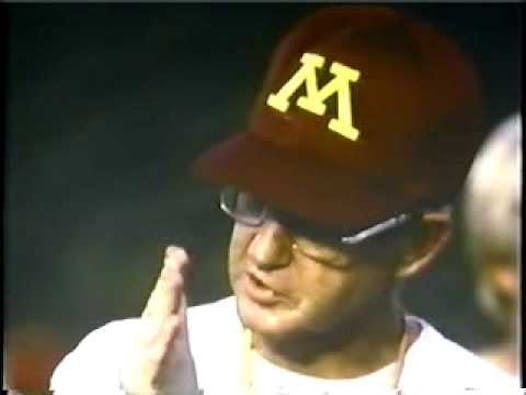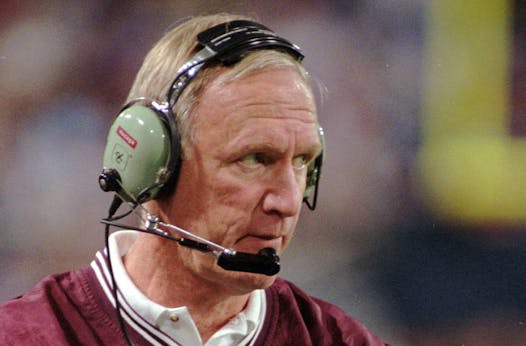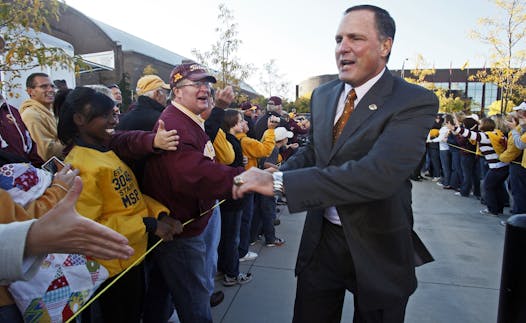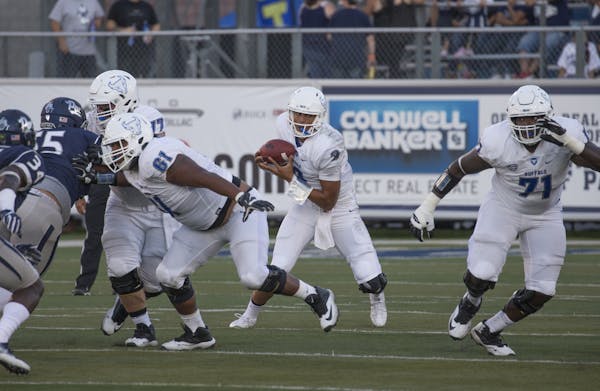Henry Williams coached University of Minnesota football for 22 seasons at the start of the 20th century. Murray Warmath ranks as the second longest-serving Gophers coach, with 18 seasons from 1954 through 1971.
Phillip John Fleck starts his competitive tenure with the woeful Buffalo Bulls (not to be confused with the woeful Buffalo Bills) on Thursday night. Fleck will turn 37 on Nov. 29 and has a chance to eventually rank high on the Gophers' seniority list for coaches.
Fleck will be the 10th full-time head coach since Warmath was forced out in 1971. It's not a news bulletin that a majority of those coaches were hired to dredge up the Gophers from near the bottom of the Big Ten, although that's not always been the case.
As someone who has observed the Gophers going in and out of all 10 coaching changes, here's a bit of a ranking — from most difficult situation inherited (10) to the least difficult (1) — for coaches taking over at Minnesota.
10. Lou Holtz (1984): Joe Salem had lost 18 of his last 19 games as coach. The '83 Gophers were 1-10 and gave up 50 or more points six times, including 69 to Ohio State and 84 to Nebraska.
Holtz stayed only two seasons before leaving for Notre Dame. While here, he forced the university to raise the budget for assistants and to raise funds for what would serve as the football practice building for three decades. Holtz left with the 6-5 Gophers scheduled to play in the 1985 Independence Bowl in Shreveport, La.
9. Glen Mason (1997): Likable though he was, Jim Wacker was a five-season disaster for the Gophers — 8-32 in the Big Ten, and 17-39 overall. Mason and his staff started off by improving the talent on hand through coaching.
They also changed offensive strategy. Wacker's teams tried to outscore opponents throwing the ball. Mason built a mighty running game that would have a chance to protect a defense that generally was going to be limited in speed.
When assessing his decade here, many of us need a reminder as to how screwed up it was when Mason arrived.
8. Jerry Kill (2011): Country Jer inherited minimal talent that had been poorly coached. He also walked into an academic mess and an aged practice building. He did well in all areas, had just turned 56, and would have had a long run here without his health issues.
7. Cal Stoll (1972): As football went from a power to a speed game, Warmath's program had fallen behind in his last few seasons. Stoll came into that void and upgraded recruiting. He did that even though new athletic director Paul Giel wasn't able to change the Gophers' tradition of being low budget in all areas, including paying assistants.
6. Jim Wacker (1992): John Gutekunst's program had gone off the rails in 1991, with a 2-9 overall record and last-place finish in the Big Ten. Wacker walked into an underfunded, low-talent situation and proved helpless to do anything about it.
5. Joe Salem (1979): There was offensive talent left from Stoll and Smoky Joe coached that phase of the game well. He couldn't pay assistants, and he was originally recruiting to dilapidated Memorial Stadium. By the time the Gophers moved into the Metrodome in 1982, the talent was more suited for the Mid-American Conference than the Big Ten.
4. Tracy Claeys (October 2015): This is just a theory, but If Drew Wolitarsky's reception with 12 seconds left had remained a touchdown, giving the Gophers the upset of Michigan in Claeys' first game on Halloween night in 2015, Big Country still would be the Gophers coach. Claeys went from hero to goat in the closing confusion on that rowdy night, and the public never changed its opinion of him.
3. John Gutekunst (1986): "Gutey" had a major problem in that he wasn't Lou. The public wanted Lou, and the recruits wanted Lou (as a few did by following him to Notre Dame).
2. Tim Brewster (2007): Even moving into the new on-campus stadium in 2009 couldn't save Coach Brew. He specialized in bringing chaos to order.
1. P.J. Fleck (2017): Five years ago, the Star Tribune had a headline reading, "At U, concern grows that 'A' stands for average." Liberal grading might be a problem for a few professors, but it's good for football — for Kill, briefly for Claeys and now Fleck.
There's a fabulous new $170 million facility about to open, with football as the main beneficiary. There's full funding for assistants and recruiting. There's a nucleus of a 9-4 team coming off an upset bowl victory.
No new Gophers coach among the 10 since Warmath has had an inheritance to compare with what Fleck has been handed.
Patrick Reusse can be heard 3-6 p.m. weekdays on AM-1500. • preusse@startribune.com
Reusse: Shaver was 'Voice of the North Stars' and an all-time great guy

Reusse: There's no doubt Finch is the right coach for the Wolves

Reusse: How bad are the White Sox? They made Twins look good.

Reusse's Tortured Columnist Department update: Yes, Vikings won the offseason






